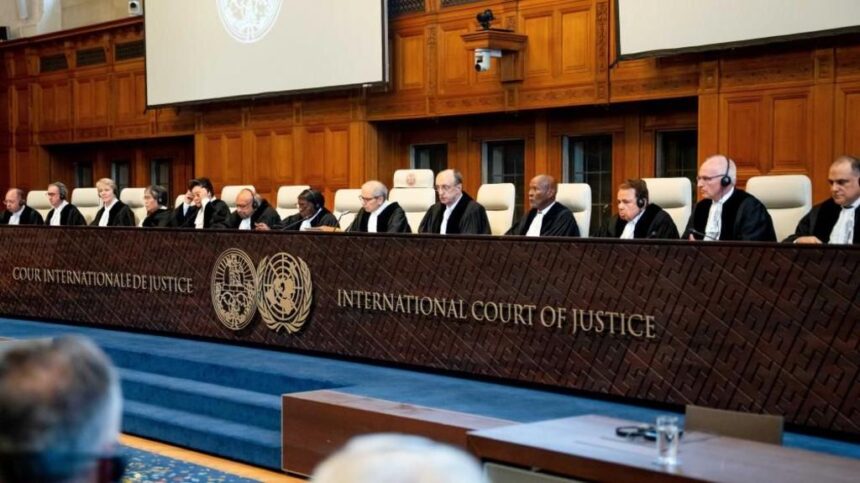Summary by Geopolist | Istanbul Center for Geopolitics:
On July 19, 2024, the ICJ issued an Advisory Opinion on Israel’s occupation of Palestinian territories, requested by the UN General Assembly in Resolution A/RES/77/247. The ICJ confirmed that Israel’s actions, including settlements and annexations, violate international law, the Geneva Convention, and the Hague Convention. The Court held that the occupation has become illegal, demanding its immediate end and reparations for Palestinians. The ruling places the responsibility on the international community and the UN to enforce these findings and emphasizes that no state should recognize or support Israel’s actions in the occupied territories.
Read more below.
The ICJ Decision on Israel’s Occupation of the Palestinian Territories
On Friday, July 19, 2024, the International Court of Justice (ICJ) issued its Advisory Opinion in the case brought before it on Israel’s occupation of the Palestinian territories at the request of the General Assembly of the United Nations on 30 December 2022, as stipulated in Resolution A/RES/77/247. Over 55 countries filed briefs with the ICJ giving their perspectives on the issues the case raises, including countries that opposed the ICJ having any jurisdiction or authority over it. This Advisory Opinion is a distinct and separate action from the genocide case brought by South Africa against Israel in which the Court issued a number of preliminary orders summarizing its findings that there is a plausible case of genocide by Israel against the Palestinians.
It is also distinct from the case being investigated before the International Criminal Court (ICC), in which the Prosecutor is seeking arrest warrants against two Israeli officials, Prime Minister Benjamin Netanyahu and Defense Minister Yoav Gallant, and three Hamas leaders, Yahya Sinwar, Mohammed al-Masri, and Ismail Haniyeh, for alleged war crimes committed during the fighting in Gaza that started on October 7, 2023. (On July 24, the ICC postponed until August 6 issuing the arrest warrants after being flooded with briefs on the matter by some 60 countries.)
To be sure, these cases are part of a renewed interest in using international fora for litigating issues pertaining to war crimes, apartheid, genocide, and crimes against humanity, a development that has led to a marked increase in the case loads of these international tribunals.
Questions Put to the Court
The original General Assembly resolution of December 30, 2023, directly contained two specific questions for the ICJ to adjudicate:
a) “What are the legal consequences arising from the ongoing violation by Israel of the right of the Palestinian people to self-determination, from its prolonged occupation, settlement and annexation of the Palestinian territory occupied since 1967, including measures aimed at altering the demographic composition, character and status of the Holy City of Jerusalem, and from its adoption of related discriminatory legislation and measures?” and,
b) “How do the policies and practices of Israel referred to … above affect the legal status of the occupation, and what are the legal consequences that arise for all States and the United Nations from this status?”
The ICJ usually deals with cases brought by one member state against another, and its decisions are well argued, carefully reached, and routinely accepted by the parties to a dispute. Under its Charter, however, the ICJ also has the power to issue Advisory Opinions when requested to do so by a relevant United Nations body in order to clarify legal issues. Its jurisdiction is limited to strictly legal issues, and it has discretion to refuse to hear a case where there are compelling reasons not to do so. In fact, before addressing the two issues before it—Israel’s actions and the status of the occupation—the Court spent considerable effort addressing six different arguments challenging its jurisdiction, or why, given its discretion, it should not refrain from exercising it. The Court’s Secretariat published a summary of its opinion on this and other issues contained in the case and of how each judge voted on them.
1. While the judges unanimously held that they have jurisdiction, since the issues before the Court did in fact constitute a “legal issue” that justified its intervention, they felt obliged to rule by majority vote on each of the arguments for refraining from exercising that jurisdiction. They dismissed these arguments by a clear majority, in the process dispatching many challenges by Israeli apologists. They first dealt with the claim that this was a dispute between two parties, and that one of them (Israel) did not consent to its jurisdiction. The Court held that this was also an international dispute of concern to the United Nations and its relevant bodies, and therefore should be addressed.
2. The Court also dismissed the claims that its ruling would “undermine the peace process” between the Palestinians and Israel, or that it would make difficult the role of the General Assembly to address the conflict. It held that the occupied territories constitute one single unit, and thereby rejected the argument that Israel’s redeployment out of the Gaza Strip in 2005 constituted an end to its occupation of that territory, or changed the international law applicable to the Strip. It also addressed and rejected the argument that in the Oslo Accords of the 1990s, the Palestinians had waived certain rights regarding the status of the occupied territories, pointing out that such a waiver would have no legal effect.
The Court also rejected the argument that it lacked sufficient evidence and materials to make a decision on the case, pointing out that with the submissions of all intervening countries, it had sufficient information and data to make its determination. Finally, it rejected the argument that the questions put to it were biased in their manner and presumed that there was a violation of international law by Israel. The Court stated that it was capable on its own to make that determination and would not be biased by the manner in which the General Assembly put the questions to it.
3. The Court then addressed the two substantive issues placed before it by the General Assembly [a) and b) above]. On the first issue, the Court’s ruling simply confirmed what the majority of international jurists have always maintained, but specifically dealt with some of the claims that have questioned these conclusions. The Court held that the entirety of the occupied Palestinian territories formed one integral unit, and that measures Israel took with regard to East Jerusalem and the Gaza Strip did not change that reality. It also held that under international law, Israeli settlements, steps to deny Palestinian self-determination, and attempts to annex parts of the West Bank into Israel were illegal and null and void.
In arriving at that conclusion, the Court reaffirmed its previous findings in the case of the Separation Wall built by Israel in the occupied West Bank, but added significant findings, namely that the behavior of Israel violates both the Geneva IV Convention and the Hague Convention (article 43, 52, and 55). This is significant because Israeli Courts have argued in the past that only the Hague Convention (representing Customary International law) applies. Israeli Courts had held that the Geneva convention, which it considered to be Treaty Law, had not been codified by the Israeli Knesset, and therefore the Israeli Courts refused to apply it. By holding that Israel violated both the Geneva Convention and the Hague Convention, the Court left no room for doubt that Israel, and its settlement policy, violated international law.
The Court held that Israel’s behavior violated the Hague Convention because of its settlements, and the manner it used the resources of the occupied Palestinian territories, particularly water resources, to benefit itself and its settlers. It also found a violation of the Hague Convention in Israel’s persistent obstruction and denial of the Palestinian right to self-determination.
According to the Court, the nature of occupation law was that it is temporary, and that the position of the occupying power is that of a usufruct, acting ultimately for the benefit of the occupied civilian population, and not its own. Israel’s behavior in settling the land, and its annexationist policies were clearly contrary to international law, whether that annexation was de jure (as in the case of East Jerusalem) or de facto, as in the case of the West Bank. The relevant consideration is that Israel’s policies were intended to be permanent, and therefore contradicted the belligerent occupation status, which categorically rejected the use of force for the acquisition of territory.
Moving to the second, and perhaps more significant question posed in a) above, the Court had to address a central issue which dealt with the status of the territories occupied by Israel in 1967. The vast majority of international jurists have agreed that the status of the territories was that of belligerent occupation, and that Israel’s actions were illegal, affirming the ICJ’s decision regarding the Separation Wall. But Professor Michael Lynk—the former UN Special Rapporteur on the situation of human rights in the occupied territories—floated the idea that the occupation itself is illegal, and the Court agreed. In its opinion, the Court first indicated that the entirety of the occupied territories, including East Jerusalem and the Gaza Strip were to be treated as one unit. It also decided that the legal status of the entire territory was to be determined and should not be influenced by Israeli attempts to fragment it by treating East Jerusalem and Gaza differently from the rest of the occupied territories.
The Court then proceeded to hold that based on its findings and answers to the first question (Israeli actions), and found that Israel violated the prohibition on acquisition of territories by force, and that it systematically obstructed the Palestinian right to self-determination. For these reasons it held that the Israeli occupation has itself become illegal and should be terminated forthwith. In its majority opinion, the issue was no longer that of Israeli violations of the law of belligerent occupation, but that the very nature of the occupation itself became illegal and should be immediately ended. Israel was therefore required to end it, return all assets to the Palestinians, allow the repatriation of the displaced, and pay compensation to the Palestinians for its illegal occupation.
4. The Court’s decision also had legal consequences for other states. According to the Court, they were under obligation not to recognize the changes that Israel made, and not to render any aid or assistance to it in maintaining the current illegal status. The same applied to United Nations bodies that were also required to not recognize Israeli actions. Furthermore, the General Assembly and the Security Council were to determine the precise modalities for implementing this decision as soon as possible.
Specifically, voting in the Court on the different aspects of the case was as follows:
- Unanimous vote in favor of the Court’s jurisdiction to adjudicate the case;
- A 14 to 1 majority agreed to comply with the United Nations request to give the Advisory Opinion;
- An 11 to 4 majority agreeing that the State of Israel’s continued occupation of the Palestinian territories is unlawful;
- A majority of 11 to 4 agreed that the State of Israel is under obligation to bring an end to its unlawful occupation of the Palestinian territories as rapidly as possible;
- A majority of 14 to 1 voted that the State of Israel is under obligation to immediately cease all new settlement activities and to evacuate all settlers from the occupied territories;
- A majority of 14 to 1 agreed that the State of Israel has an obligation to make reparations for damages caused to all natural or legal persons concerned in the occupied territories; and,
- A majority of 12 to 3 approved that all states are under an obligation not to recognize the situation arising from the unlawful occupation by the State of Israel as legal, and not to render assistance in maintaining the status created by the continued occupation.
Different Judges, Different Perspectives
One judge, ICJ Vice President Julia Sebutinde of Uganda gave a dissenting Opinion rejecting the findings of the Court and repeating the argument that the case should be settled through negotiations between the parties. She also argued that the Court should have taken into consideration the Oslo Accords and the needs of both parties to security and self-determination.
Other judges offered separate declarations, or partial dissents, offering their own legal reasonings. The most prominent legal argument in those minority Opinions was that the actions of the Israeli government, including settlement activity and annexation, were illegal and contrary to international law, but that they do not render the occupation itself to be illegal.
The decision as a whole was a comprehensive summary of the position of international law on the occupation, and a detailed legal refutation of each and every argument that had been used by Israel and its apologists for maintaining the occupation in any shape or form.
One take-away from the decision is that it placed the duty of implementing it squarely on the shoulders of the international community, as well as the Security Council and General Assembly of the United Nations. The ICJ has no armies or power to implement its decisions; it can only explain the law and spell out the legal responsibilities of the different parties. It is thus up to each country to carry out its duty to make sure Israel abides by international law provisions, or face the consequences of its illegal actions. This is precisely why the immediate negative reaction to the decision by Israel and the United States betrayed great worry as they warned countries not to use this decision to take “unilateral action” regarding the occupation, but to adhere to the established framework of US-led negotiations between the two parties.
By: Jonathan Kuttab
Source: Arab Center Washington DC (ACW)







